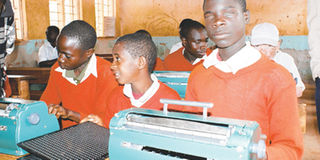Children with special needs plea to new govt

Standard Six pupils from Ruhila Primary School in Ruvuma. Children with special needs should be educated in an inclusive environment with ordinary pupils. PHOTO I FILE
What you need to know:
With the given promises in education sector, including giving free education from primary to university levels, people with disabilities in the country are also hoping that the leaders will provide them with proper care and ensure more children with disabilities enroll in school.
Only five days are remaining before Tanzanians vote in the October 25 General Election. As usual, politicians have promised a lot of goodies in an attempt to woo the electorate.
With the given promises in education sector, including giving free education from primary to university levels, people with disabilities in the country are also hoping that the leaders will provide them with proper care and ensure more children with disabilities enroll in school.
Various education stakeholders and people with disabilities who spoke with Success said a lot still needs to be done as far as education for people with disabilities is concerned. However, they have a feeling that policy makers and parents with children with disabilities need to rethink on the best ways to help these children get their right to education.
In 2011, only 0.35 per cent of all children enrolled in primary schools had disabilities. In secondary schools, 0.3 per cent of boys and 0.25 per cent of girls have disabilities.
These percentages are extremely low when compared to the estimated 7.8 per cent of the population with disability in Tanzania and indicates that most children who are physically impaired are not enrolled.
The National Bureau of Statistics (NBS) 2012, shows that it is estimated that Tanzania has 4.4 million persons with disability of different forms out of the estimated total population of 44.9 million.
Felician Mkude, who is the secretary general of the Federation of Societies for Persons with Disabilities Tanzania, says that, apart from the fact that it is very hard for people with disabilities to vote in a peaceful manner due to the challenging environment, it also affects the learning process of children with disabilities in the country. Mr Mkude, who is also visually impaired says that people with disabilities should be given very special treatment as soon as the successful leaders step into power.
According to Mr Mkude, it is known that people with disabilities have special needs that should be considered as crucial. He also pointed out that the National Electoral Commission of Tanzania (NEC) should also think of the best ways to help people with disabilities of different forms to vote according to their needs.
“We, people with disabilities know who we want to put in power. We are also part of this country. NEC should make sure we are given priority on the voting day as we have special needs,” says Mkude.
Adding to that he says, lack of teaching and learning materials, lack of teachers with proper training on the people with disabilities, lack of awareness among parents with children with disabilities are some of the things that need to be urgently addressed to change lives of persons with special needs in Tanzania.
He says that, majority of parents with children with disabilities lock up their children and don’t expose them to education thinking that their children will never be able to make any difference even if they enroll in schools.
Mr Mkude pointed out that, they are missing a very big point since these children are just as normal as any other if they are shown love and given their right to education.
He urged the stakeholders in education and people with disabilities to help raise awareness among parents with children with disabilities. Failure to do so, those parents will never understand how possible it is for children with special needs to have successful lives.
Hamis Sabil Kwanza, 50, and Zena Hassan, 41, are farmers living in Mkuranga District. Their three children suffer from cerebral palsy. The children are Hamidu, 16, Hussein, 10, Shan, 8, and the last born is Mwalami.
Sabil Kwanza says that, his children are at the age of going to school but none of them is going due to lack of funds to buy wheelchairs to ease mobility. The coming leaders in power should consider such parents by providing just some little funds to support the family with transport and proper learning materials.
“A child with disability is very expensive to raise. What about three children with disability? I can only afford food and not on a daily basis. If I was to be supported in education I would have taken my children to school,” says Kwanza.
“Now that my children are not going to school, it is also hard for us to get enough time for farming activities. We spend too much time taking care of the children. And none from our community is trying to help us. I call upon policy makers to help us in making things possible and easier for families with children with disabilities,” adds Kwanza.
With the National Policy on disability of 2004 aiming at improving life situation of persons with disability by encouraging development and empowering such families, the real situation on the ground is still very challenging.
The National policy talks about improving service delivery, to allow participation of persons with disability in decision making and implementation of important activities in the society.
A lot has to be improved in Tanzania from family levels to support the aim of the National policy on disability, which also aims at enabling families of persons with disability and the society at large to participate in decisions and implementation of important disability-friendly activities.
Zaituni Juma, 30, is a mother of three children. Two of her children, Nasra and Suleiya are with albinism. All she needs from the government is to get enough security for children with albinism.
When albino killings rocked the country in 2006, Nasra was also among the children targeted by the dangerous people. During night hours, unidentified people would knock and our neighbours warned us not to open the door.
“My daughter Nasra was among the targeted persons with albinism to be killed.
People with ill intentions tried to raid our house three times a week until my family decided to move from Kunduchi to Kibaha to hide my child,” says Zaitun.
Adding to that she said, her husband is a motorcycle rider who visits his family in Kibaha during weekends.
This makes it harder for her to manage security at home especially at night. She further says that about two years ago, Nasra and Suleiya were almost attacked by an unidentified man who gained access to her house. She screamed but since neighbours are far from her house, none of them showed up to help them. She, however, managed to defend and protect her children.
With the given situation, the government needs to look for proper ways to provide security as well as access to proper learning facilities, she adds.
Francis Msolwa is the head teacher at Kidugalo Primary School in Kisarawe District. He says that, children with disabilities are a blessing from God. If they are well treated they are in a position to perform even better in school.
However, the challenges on disability issues remain uncounted as the real situation on the ground is so bad that it needs political goodwill to support these children. Adding to that he says, learning materials for children with disabilities are very expensive for ordinary parents to afford.
Commenting on the matter, Ibrahimu Tuly, the Secretary of Tanzania Federation of the Disabled in Kisarawe (lives with albinism) says that, as a way to rescue children with albinism in 2006, they collected 15 pupils from different schools in Kidugalo Village and took them to a special school for children with albinism.
He says that, if the coming leaders should put themselves in the position of people with disabilities, they would clearly understand the challenges they face and there would be no need of reminding them to do the needful.




